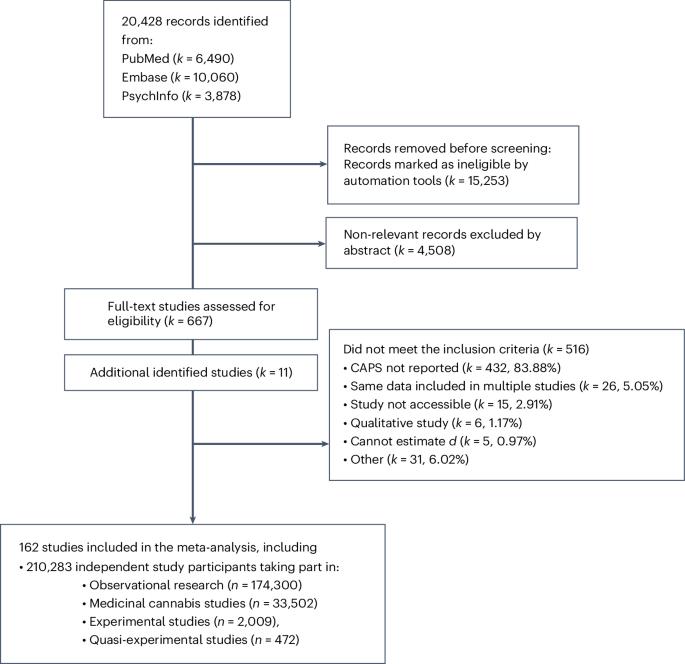Assessing rates and predictors of cannabis-associated psychotic symptoms across observational, experimental and medical research
引用次数: 0
Abstract
Cannabis, one of the most widely used psychoactive substances worldwide, can give rise to acute cannabis-associated psychotic symptoms (CAPS). While distinct study designs have been used to examine CAPS, an overarching synthesis of the existing findings has not yet been carried forward. To that end, we quantitatively pooled the evidence on rates and predictors of CAPS (k = 162 studies, n = 210,283 cannabis-exposed individuals) as studied in (1) observational research, (2) experimental tetrahydrocannabinol (THC) studies, and (3) medicinal cannabis research. We found that rates of CAPS varied substantially across the study designs, given the high rates reported by observational and experimental research (19% and 21%, respectively) but not medicinal cannabis studies (2%). CAPS was predicted by THC administration (for example, single dose, Cohen’s d = 0.7), mental health liabilities (for example, bipolar disorder, d = 0.8), dopamine activity (d = 0.4), younger age (d = −0.2), and female gender (d = −0.09). Neither candidate genes (for example, COMT, AKT1) nor other demographic variables (for example, education) predicted CAPS in meta-analytical models. The results reinforce the need to more closely monitor adverse cannabis-related outcomes in vulnerable individuals as these individuals may benefit most from harm-reduction efforts. The authors synthesize data from previous literature on observational, experimental and medicinal cannabis research to assess rates and predictors of cannabis-associated psychotic symptoms.

通过观察、实验和医学研究评估大麻相关精神病症状的发生率和预测因素
大麻是全球使用最广泛的精神活性物质之一,可引起急性大麻相关精神病性症状(CAPS)。虽然已有不同的研究设计用于研究 CAPS,但尚未对现有研究结果进行全面总结。为此,我们对有关 CAPS 发生率和预测因素的证据(k = 162 项研究,n = 210,283 名暴露于大麻的个人)进行了定量汇总,这些证据包括:(1)观察性研究;(2)四氢大麻酚(THC)实验研究;(3)药用大麻研究。我们发现,由于观察性研究和实验性研究报告的 CAPS 发生率较高(分别为 19% 和 21%),而药用大麻研究报告的 CAPS 发生率较低(2%),因此不同研究设计的 CAPS 发生率差别很大。预测 CAPS 的因素包括四氢大麻酚给药量(例如单剂量,Cohen's d = 0.7)、精神健康责任(例如躁郁症,d = 0.8)、多巴胺活性(d = 0.4)、年龄较小(d = -0.2)和女性性别(d = -0.09)。在元分析模型中,候选基因(如 COMT、AKT1)或其他人口统计学变量(如教育程度)均不能预测 CAPS。这些结果进一步说明,有必要更密切地监测易感人群与大麻相关的不良后果,因为这些人可能从减少危害的努力中获益最多。作者综合了以往关于观察性、实验性和药用大麻研究的文献数据,以评估大麻相关精神病症状的发生率和预测因素。
本文章由计算机程序翻译,如有差异,请以英文原文为准。
求助全文
约1分钟内获得全文
求助全文

 求助内容:
求助内容: 应助结果提醒方式:
应助结果提醒方式:


